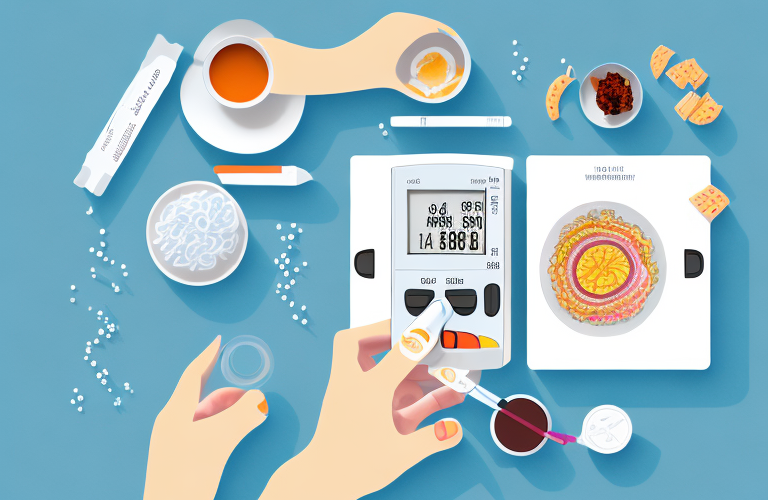During pregnancy, women can experience a range of health conditions, including gestational diabetes. Gestational diabetes is a type of diabetes that develops during pregnancy and can affect both the mother and the baby’s health. In this article, we will discuss everything you need to know about gestational diabetes, from its causes and symptoms to how to manage it effectively and reduce the risk of developing type 2 diabetes after pregnancy.
What is Gestational Diabetes?
Gestational diabetes is a type of diabetes that occurs during pregnancy and usually disappears after childbirth. It is caused by hormonal changes that affect insulin sensitivity, resulting in high blood glucose levels. Gestational diabetes can affect both the mother and the fetus and can lead to serious complications if left untreated.
It is estimated that gestational diabetes affects around 10% of pregnancies worldwide. Women who are overweight, have a family history of diabetes, or have previously had gestational diabetes are at a higher risk of developing the condition. Gestational diabetes can often be managed through diet and exercise, but in some cases, medication or insulin injections may be necessary to control blood sugar levels. It is important for pregnant women to attend regular prenatal check-ups and to be screened for gestational diabetes to ensure the health of both mother and baby.
Causes and Risk Factors of Gestational Diabetes
The exact cause of gestational diabetes is not known, but hormonal changes during pregnancy can lead to insulin resistance, resulting in high blood glucose levels. Women who have certain risk factors are more likely to develop gestational diabetes, such as being overweight or obese, having a family history of diabetes, being over 25 years of age, or having previously given birth to a baby weighing more than 9 pounds.
In addition to these risk factors, studies have also shown that women who have had gestational diabetes in a previous pregnancy are at a higher risk of developing it again in future pregnancies. Other factors that may increase the risk of gestational diabetes include polycystic ovary syndrome (PCOS), a history of gestational diabetes in the family, and certain ethnic backgrounds such as African American, Hispanic, Native American, or Asian.
Symptoms and Diagnosis of Gestational Diabetes
Most women with gestational diabetes have no noticeable symptoms. This is why it is important to get tested during pregnancy, usually between 24 and 28 weeks, as part of routine prenatal care. The test involves drinking a sugary solution and having your blood glucose levels tested one hour later. If the result is higher than normal, a follow-up test called an oral glucose tolerance test (OGTT) may be required.
It is important to note that some women may be at a higher risk for developing gestational diabetes, including those who are overweight, have a family history of diabetes, or have previously given birth to a baby weighing over 9 pounds. Additionally, women who are diagnosed with gestational diabetes are at a higher risk for developing type 2 diabetes later in life. Therefore, it is important to maintain a healthy lifestyle and monitor blood sugar levels after giving birth.
How to Manage Gestational Diabetes
If you are diagnosed with gestational diabetes, you will be referred to a healthcare team that will help you manage your condition. The recommended treatment plan usually involves making changes to your diet and lifestyle, including regular physical activity, monitoring your blood glucose levels, and taking medication if necessary.
It is important to attend all scheduled appointments with your healthcare team to ensure that your gestational diabetes is being properly managed. They may also provide you with additional resources and support, such as a diabetes educator or nutritionist, to help you make the necessary lifestyle changes. It is also important to communicate any concerns or questions you may have with your healthcare team, as they are there to support you throughout your pregnancy.
Treatment Options for Gestational Diabetes
The main treatment for gestational diabetes is a healthy diet and regular physical activity. This can help control blood glucose levels and prevent complications. In some cases, medication such as insulin may be necessary to manage gestational diabetes. Your healthcare team will work with you to create a personalized treatment plan that meets your individual needs.
In addition to diet and exercise, monitoring blood glucose levels is an important part of managing gestational diabetes. Your healthcare team may recommend testing your blood glucose levels several times a day to ensure they are within a healthy range. They may also suggest keeping a food diary to track your carbohydrate intake and help you make healthier food choices.
If left untreated, gestational diabetes can lead to complications for both the mother and baby. These can include preterm labor, preeclampsia, and a higher risk of developing type 2 diabetes later in life. It is important to attend all scheduled prenatal appointments and follow your healthcare team’s recommendations to ensure a healthy pregnancy and delivery.
The Importance of Monitoring Blood Sugar Levels during Pregnancy
Monitoring your blood sugar levels is crucial during pregnancy, especially if you have gestational diabetes. This will help you and your healthcare team make informed decisions about managing your condition. You may need to test your blood glucose levels several times a day to ensure that they are within a safe range.
In addition to monitoring your blood sugar levels, it is also important to maintain a healthy diet and exercise regularly during pregnancy. This can help control your blood sugar levels and reduce the risk of complications for both you and your baby. Your healthcare team can provide guidance on the best diet and exercise plan for your individual needs.
Dietary Guidelines for Women with Gestational Diabetes
A healthy diet is essential for managing gestational diabetes. Your healthcare team will typically recommend a meal plan that includes a variety of foods, focusing on complex carbohydrates, fruits, vegetables, lean proteins, and healthy fats. They may also advise on how to control portion sizes and how often to eat throughout the day.
In addition to following a healthy meal plan, it is important for women with gestational diabetes to monitor their blood sugar levels regularly. This can be done through self-monitoring or with the help of a continuous glucose monitoring system. Your healthcare team will provide guidance on how often to check your blood sugar levels and what your target range should be.
Exercise Recommendations for Women with Gestational Diabetes
Regular physical activity is also important for managing gestational diabetes. It can help improve insulin sensitivity, control blood glucose levels, and reduce the risk of complications. Your healthcare team will typically recommend moderate-intensity exercise for 30 minutes a day most days of the week.
Some examples of moderate-intensity exercise include brisk walking, swimming, cycling, and low-impact aerobics. However, it is important to consult with your healthcare team before starting any exercise program, as they can provide personalized recommendations based on your individual needs and medical history.
In addition to regular exercise, maintaining a healthy diet is also crucial for managing gestational diabetes. This may include eating a balanced diet with a variety of fruits, vegetables, whole grains, lean proteins, and healthy fats. Your healthcare team may also recommend monitoring your carbohydrate intake and spacing out meals throughout the day to help control blood glucose levels.
Potential Complications of Untreated Gestational Diabetes
If gestational diabetes is left untreated, it can lead to complications for both the mother and the baby. These can include a higher risk of preeclampsia, premature birth, and babies with high birth weight. Women who have had gestational diabetes are also at a higher risk of developing type 2 diabetes later in life.
It is important to note that gestational diabetes can be managed and treated with proper medical care and lifestyle changes. However, if left untreated, it can also increase the risk of the baby developing low blood sugar, jaundice, and respiratory distress syndrome. Additionally, untreated gestational diabetes can lead to long-term health issues for the mother, such as an increased risk of heart disease and kidney damage.
How to Reduce the Risk of Developing Type 2 Diabetes after Pregnancy
Women who have had gestational diabetes are at a higher risk of developing type 2 diabetes later in life. However, there are steps you can take to reduce this risk, such as maintaining a healthy weight, eating a healthy diet, being physically active, and having regular check-ups with your healthcare provider.
One of the most effective ways to reduce the risk of developing type 2 diabetes after pregnancy is to breastfeed your baby. Studies have shown that breastfeeding can help regulate blood sugar levels and improve insulin sensitivity, which can lower the risk of developing diabetes.
In addition to lifestyle changes, some women may also benefit from medication to reduce their risk of developing type 2 diabetes. Your healthcare provider can discuss the options with you and help you make an informed decision about whether medication is right for you.
Emotional Support for Women with Gestational Diabetes
Managing gestational diabetes can be stressful, and it is important to seek emotional support if you need it. This can include talking to a healthcare provider, joining a support group, or talking to friends and family members.
It is also important to prioritize self-care during this time. This can include engaging in activities that bring you joy, such as reading, taking a warm bath, or practicing yoga. Additionally, getting enough rest and eating a balanced diet can help improve your emotional well-being and overall health.
Tips for Coping with the Challenges of Managing Gestational Diabetes
Managing gestational diabetes can be challenging, but there are several tips that may help. These include practicing stress management techniques, staying organized with meal planning and testing, and educating yourself about your condition.
In conclusion, gestational diabetes is a common health condition that can affect pregnant women. However, with the right treatment and management strategies, it is possible to control blood glucose levels and prevent complications. If you suspect you may have gestational diabetes or have been diagnosed with the condition, be sure to work closely with your healthcare provider to create a personalized treatment plan that meets your individual needs.
It is important to note that gestational diabetes can increase the risk of developing type 2 diabetes later in life. Therefore, it is crucial to maintain a healthy lifestyle even after pregnancy. This includes regular exercise, a balanced diet, and monitoring blood glucose levels. Your healthcare provider can provide guidance on how to continue managing your blood sugar levels after delivery.










